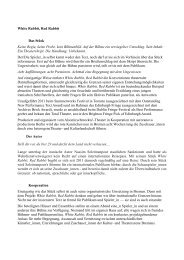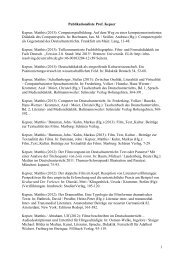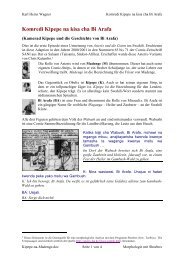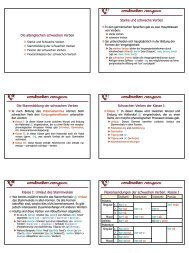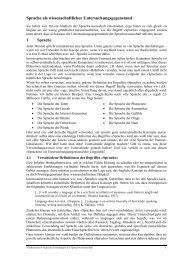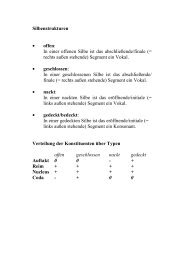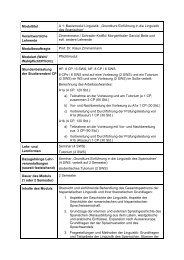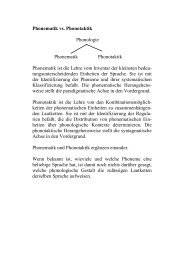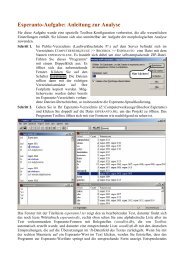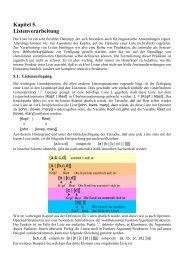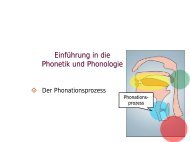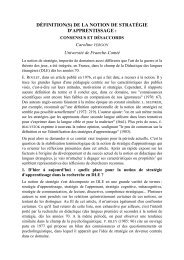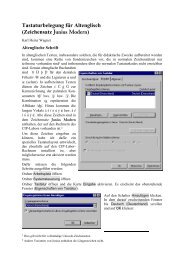Relativism and Universalism in Linguistics - Fachbereich 10 ...
Relativism and Universalism in Linguistics - Fachbereich 10 ...
Relativism and Universalism in Linguistics - Fachbereich 10 ...
Create successful ePaper yourself
Turn your PDF publications into a flip-book with our unique Google optimized e-Paper software.
88 Sections<br />
Scrambl<strong>in</strong>g <strong>in</strong> the AP <strong>and</strong> the Fractal Nature of Language<br />
Structures<br />
González-Vilbazo, Kay E. / Struckmeier, Volker<br />
University of Ill<strong>in</strong>ois at Chicago UIC / Universität zu Köln<br />
kay.gonzalez@uni-koeln.de;volker.struckmeier@uni-koeln.de<br />
The question of universalism <strong>and</strong> relativism <strong>in</strong> language is one that cannot be fully resolved<br />
with our present-day knowledge. However, it is possible to po<strong>in</strong>t out seem<strong>in</strong>gly universal<br />
pr<strong>in</strong>ciples of language, with superficial complexities aris<strong>in</strong>g from recursive operations<br />
yield<strong>in</strong>g fractal structures. The talk presents new evidence for the fractal nature of language.<br />
The operation of scrambl<strong>in</strong>g refers to changes <strong>in</strong> the order of constituents <strong>in</strong> the so-called<br />
Mittelfeld of the German sentence. The phenomenon has received ample discussion. We show<br />
that it is not restricted to the sentence level but recurs <strong>in</strong> another, seem<strong>in</strong>gly unrelated<br />
structure. In the German AP, arguments of the head place variably vis-a-vis adjuncts:<br />
(1) [DPder [AP [DPihr] [immer] treue] Max]<br />
the her-DAT always faithful Max<br />
(2) [DPder [AP [immer] [DPIHR] treue] Max]<br />
the always to-her faithful Max<br />
'Max, who is always faithful to her'<br />
This closely resembles scrambl<strong>in</strong>g at the sentence level: unstressed pronouns are basegenerated<br />
<strong>in</strong>side the VP but have to be moved to the so-called Wackernagel position, cross<strong>in</strong>g<br />
the VP-adjunct. Pronouns can be left beh<strong>in</strong>d only when they receive contrastive stress.<br />
Treat<strong>in</strong>g the <strong>in</strong>version of adjunct <strong>and</strong> pronoun <strong>in</strong> (1, 2) as scrambl<strong>in</strong>g expla<strong>in</strong>s further effects<br />
found <strong>in</strong> the pronom<strong>in</strong>al AP which are well-known from scrambl<strong>in</strong>g:<br />
(3) der [DP e<strong>in</strong>er Frau] [Adv immer] treue Max<br />
the women-DAT always faithful Max<br />
(4) der [Adv immer] [DP e<strong>in</strong>er Frau] treue Max<br />
the always a woman faithful Max<br />
With normal <strong>in</strong>tonation, the preferred read<strong>in</strong>g of (3) is that Max would be always faithful to<br />
any generic woman. In (4), on the contrary, Max is always faithful to a specific woman. The<br />
effect becomes even more dist<strong>in</strong>ct when the attributive head is a participle:<br />
(5) der [DP e<strong>in</strong>em Feuerwehrmann] [Adv immer] helfende Mann<br />
the a fireman-DAT always help<strong>in</strong>g man<br />
(6) der [Adv immer] [DP e<strong>in</strong>em Feuerwehrmann] helfende Mann<br />
the always a fireman-DAT help<strong>in</strong>g man<br />
The man is help<strong>in</strong>g any generic fireman <strong>in</strong> (5) but a specific fireman <strong>in</strong> (6). We will show that<br />
Givenness, theme-rheme <strong>and</strong> focus <strong>in</strong>terpretations seem to parallel the sentence level, too.<br />
Furthermore, the observations will be carried over to relevant Code-Switch<strong>in</strong>g data <strong>and</strong> will<br />
be expla<strong>in</strong>ed by a sentential analysis of prenom<strong>in</strong>al attributes <strong>in</strong> German.<br />
Thus, if syntactic structures (CPs) show properties recurr<strong>in</strong>g <strong>in</strong> their substructures (e.g. DPs,<br />
<strong>and</strong>, <strong>in</strong> turn, APs) a fractal system display<strong>in</strong>g simple <strong>and</strong> robust pr<strong>in</strong>ciples seems at h<strong>and</strong>. It<br />
would not seem very plausible for such a system to arise easily from the <strong>in</strong>f<strong>in</strong>itely variable<br />
cont<strong>in</strong>gencies implied <strong>in</strong> l<strong>in</strong>guistic relativism. The fractal nature of l<strong>in</strong>guistic structures might<br />
hence be taken as subtle evidence for a universalist position.



